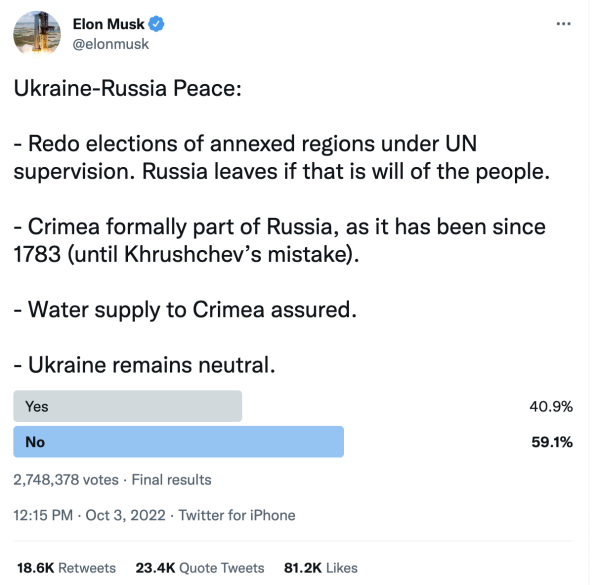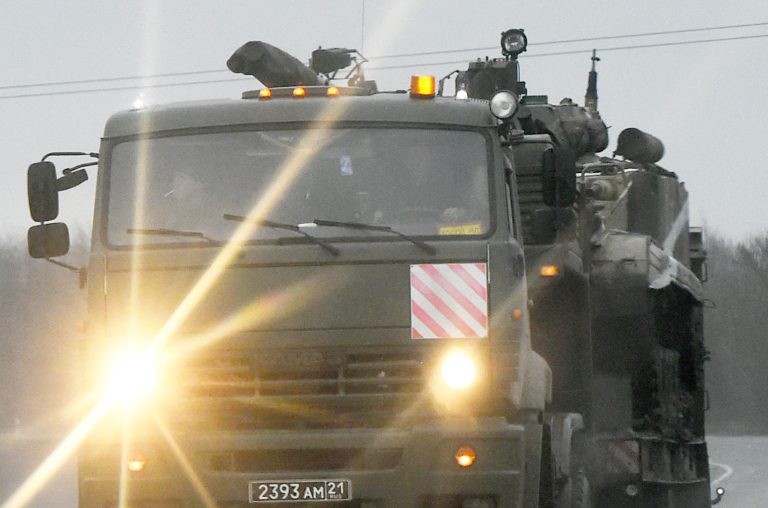Tech magnate Elon Musk has incurred accusations of pro-Russia bias after he aired his thoughts about how the war in Ukraine could be resolved without further loss of life and danger of nuclear conflict.
Russia and Ukraine have been at war since February, when Moscow launched a full-scale invasion following years of border skirmishes. Millions of Ukrainians have fled the country and both sides have suffered tens of thousands of military casualties.
In a Twitter post dated Oct. 3, Musk suggested a peace agreement according to which the United Nations would oversee referendums in the four Ukrainian regions recently annexed by the Kremlin. “Russia leaves if that is the will of the people,” Musk wrote.
READ MORE:
- Messages Reveal Downward Spiral Between Elon Musk and Twitter CEO Parag Agrawal
- Musk: ‘Woke Mind Virus’ Will Make It Impossible for Humanity to Reach Mars
At the same time, he said that the peninsula of Crimea ought to be “formally part of Russia, as it has been since 1783,” referring to the territory’s historical status until it was transferred by Russia to Ukraine in the 1950s — when both were part of the Soviet Union.
Musk further said that the decision by then-Soviet leader Nikita Khrushchev to make the transfer was a “mistake.” Russia later retook Crimea from Ukraine in 2014, when the first border hostilities between Moscow and Kiev began.

Uproar
Success
You are now signed up for our newsletter
Success
Check your email to complete sign up
Musk’s suggestion drew a slew of angry comments, with Ukrainian officials and ordinary Twitter users claiming he had no knowledge of politics and that his statements undermined the Ukrainian military’s efforts to defend its sovereign territory from Russia.
Many demanded that Russia retreat from all occupied Ukrainian territory before any negotiations be considered.
“Are you trying to legitimize pseudo-referendums that took place at gunpoint under conditions of persecution, mass executions and torture? Bad path,” Ukrainian presidential adviser Mikhailo Podolyak said on Oct. 3, in response to a follow-up suggestion by Musk.
Musk had said: “Let’s try this then: the will of the people who live in the Donbas & Crimea should decide whether they’re part of Russia or Ukraine.”
READ MORE:
- Elon Musk’s Tesla Bot Met with Worries as Reveal Date Draws Closer
- Majority of Twitter Shareholders Vote in Favor of Sale to Musk: Sources
- Tesla Needs $100 Billion Worth of Metals to Reach Musk’s 2020 Production Goal
Donbas has been a focus of the conflict since 2014, when pro-Moscow insurgents in the predominantly Russian-speaking territories started a rebellion following the Euromaidan protests and coup that spring.
In late September, Russia held referendums in four regions that it occupies the majority of, and claimed overwhelming support for union with the Russian Federation. The West rejected the votes as sham and illegal, while Russia’s president Vladimir Putin vowed to defend the new Russian territory to the end.
Musk issued a few follow-up comments defending his statements, questioning the need to continue the war at all costs, and expressing concerns that the conflict could eventually see the use of nuclear weapons.
He hinted it was unlikely that either side would be able to achieve all their war aims or decisively defeat their respective enemies, making further loss of life pointless and avoidable.
Musk also pointed to his provision of free Starlink internet access to Ukraine, and reiterated his criticism of Russia, saying that they had invaded “areas that would unequivocally choose to be part of Ukraine.”
“Shocking number of people voting No to this… Tells you how others’ right to self-determination really matters to some when it conflicts with your plans,” journalist Keean Bexte wrote in response to Musk’s tweet, which included a poll.
About 59 percent of the more than two million Twitter users who took part in the poll agreed with Musk’s statement, while the results for his earlier suggestion involving Crimea were reversed.
Putin characterizes the war as a “special military operation” to defend Russia’s national interests, as well as protect ethnic Russians in Ukraine.
Though Russia and Ukraine share common cultural roots — the ancient kingdom of Kievan Rus’ existed from 882 to 1240 in the modern territory of both countries — and spent centuries together as part of the Russian Tsarist empire, the historical relationship between the two peoples has often been fraught with conflict and persecution, particularly under the Soviet communist regime.
The dissolution of the Soviet Union into its member states in 1991 fostered growing political division between Russia and Ukraine. While Moscow backslid into authoritarian rule under president Vladimir Putin, Ukrainian authorities enacted policies to diminish Russian political and cultural influence and endeavored to align the country more strongly with the European Union and NATO.













